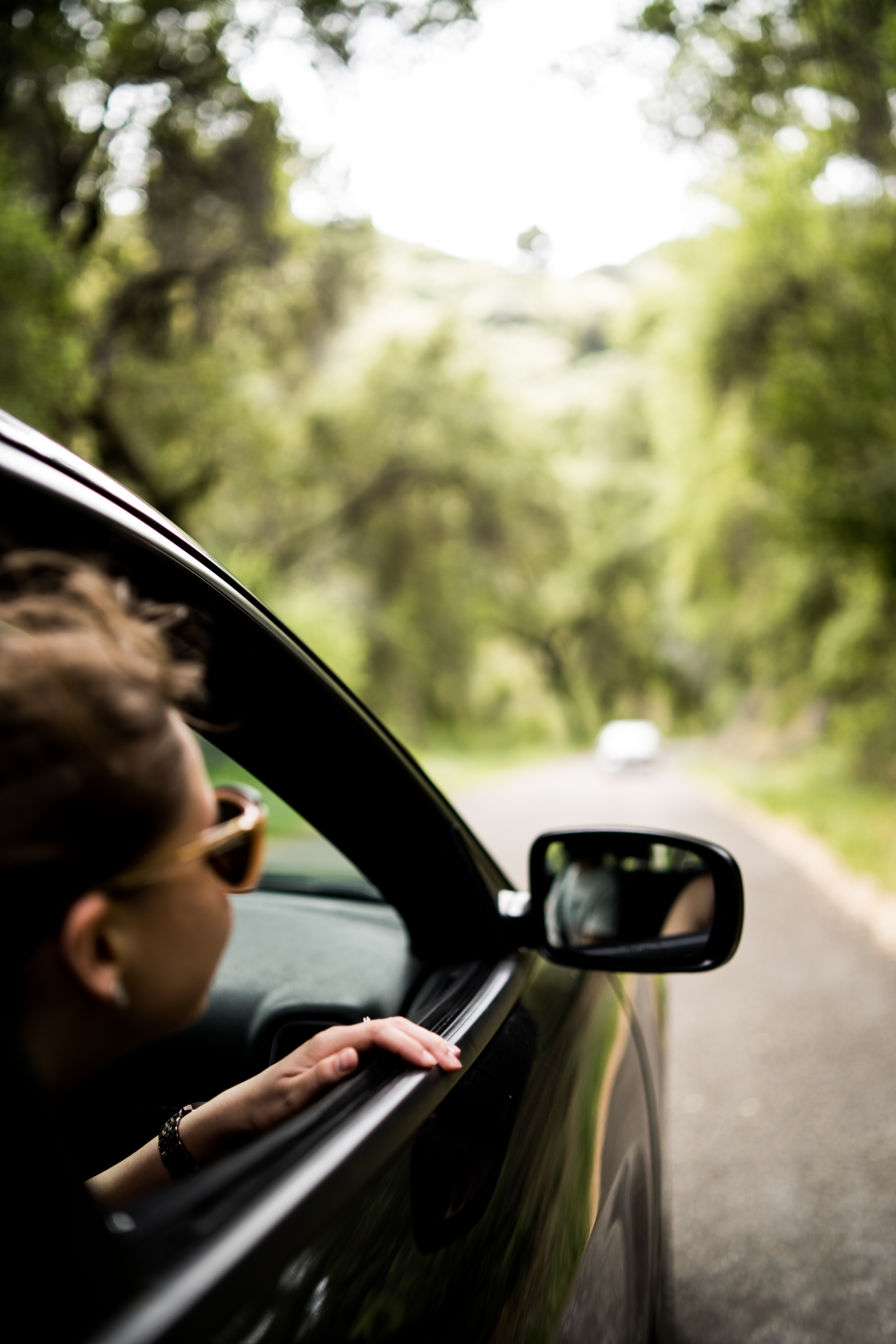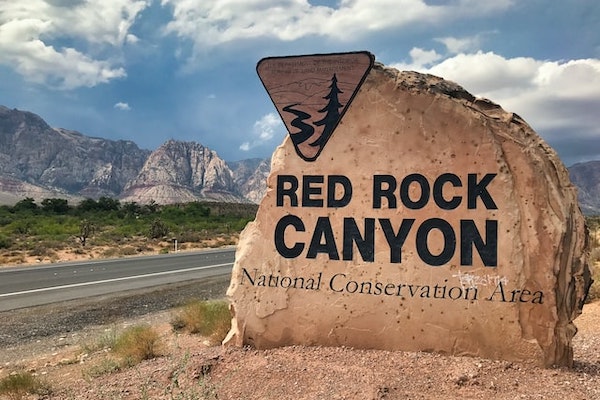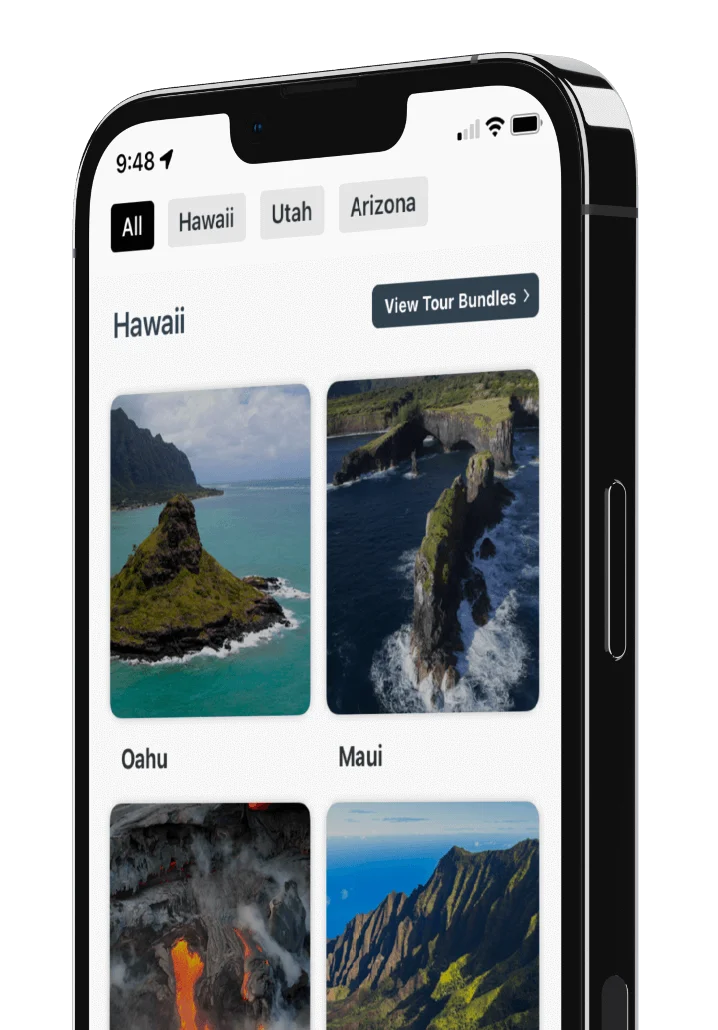
The Ultimate Lake Mead Travel Guide
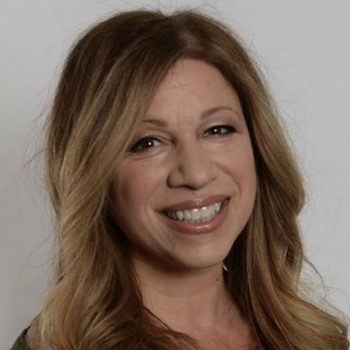
About Lake Mead National Recreation Area
Lake Mead National Recreation Area is located on the Colorado River, beginning about 25 miles southeast of the Las Vegas Strip, and covers areas in both Nevada and Arizona. Lake Mead itself is an incredible contrast of water in the midst of the driest of lands – the Mojave Desert. Lake Mead has over 290 square miles of water surface. But the entirety of Lake Mead National Recreation Area actually covers an area of 2,338 square miles and extends 240 miles along the Colorado River.
As for its history, in 1936, the Boulder Dam Recreation Area (now Lake Mead National Recreation Area) was created after the damming of the Colorado River formed the reservoir of Lake Mead. This was the very first national recreation area established in America and included Hoover Dam. Eleven years after its creation, the name was changed to Lake Mead National Recreation Area. Since Hoover Dam is run by the Bureau of Reclamation, Lake Mead was named for Elwood Mead, who was the Bureau of Reclamation commissioner at the time. And although Hoover Dam is run by the Bureau of Reclamation, Lake Mead National Recreation Area is part of the National Park System.
Information You’ll Need to Visit Lake Mead National Recreation Area
 Sunset View Overlook / Photo by Lizzie Gerecitano
Sunset View Overlook / Photo by Lizzie Gerecitano
Lake Mead National Recreation Area is open 24 hours a day, 365 days a year, with beautiful scenic driving, overlooks, hikes, and that lake! Some of the beaches and other areas are day-use only, from dawn until dusk. These areas are marked on site with signs. There are sometimes temporary closures or conditions (for instance, some of the hiking trails are shut down in the late spring and summer when it gets dangerously hot) so consult the park rangers at the Visitor Center at the Nevada entrance near Hoover Dam, or check its website.
Lake Mead entrance fees (and lake use fees) can be purchased online or at one of the Fee Booth stations. If you have an annual National Park Pass, that’s acceptable here. Otherwise, the entrance fee is $25 per vehicle, good for seven consecutive days. The closest entrance to Hoover Dam is on Boulder City Parkway. After you stop at the Visitor Center to collect maps of where you want to go, what you want to see, or for the hiking trails you want to take (by the way, Shaka Guide has offers a fantastic tour route for Lake Mead National Recreation Area combined with Hoover Dam), continue down the road to the Fee Booth that leads to Boulder Beach and beyond.
RELATED: One-Day Itinerary: Hoover Dam & Lake Mead
Getting to Lake Mead National Recreation Area
One of the reasons Lake Mead National Recreation Area gets so many visitors is that it is next to one of the biggest tourist attractions in the U.S. – Hoover Dam, and a mere 25 miles from the tourist mecca of Las Vegas. From the city, it’s an easy, half hour to 45-minute drive southeast to Lake Mead (depending on time of day, traffic and which route you choose to get there).
The closest airport to the Lake Mead National Recreation Area near Hoover Dam is Harry Reid International Airport (formerly named McCarran International). This airport is situated in the heart of Las Vegas.
Lake Mead National Recreation Area has astounding beauty to offer you, from scenic driving to overlooks, hiking and Boulder Beach – the shoreline of Lake Mead (which you see, of course, from the rim of Hoover Dam when you’re up there.) Stop at the Lake Mead Visitor Center for maps and advice (or take the Shaka Guide tour which is full of great suggestions)! With Hoover Dam having created Lake Mead and sitting, literally, on top of it, no visit to Lake Mead National Recreation Area is complete without also visiting Hoover Dam.
If you have extra time during a trip to Lake Mead/Hoover Dam/Las Vegas and would like to see another incredible place close to the city, you should head to Red Rock Canyon, which is less than a half hour west of Las Vegas. (Shaka Guide offers an incredible tour of Red Rock Canyon, too)!
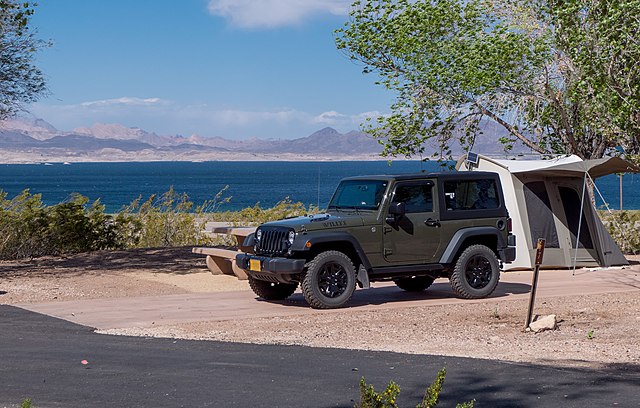 Boulder Beach / Andrew Cattoir (Lake Mead National Recreation Area), Public domain, via Wikimedia Commons
Boulder Beach / Andrew Cattoir (Lake Mead National Recreation Area), Public domain, via Wikimedia Commons
If you’re also planning a trip to the Grand Canyon from Lake Mead (from the area closest to Las Vegas and near Hoover Dam) here’s what you need to know:
The West Rim of the Grand Canyon is just under a two hour drive. This location is actually on the grounds of the Hualapai Reservation. From there, you can walk 70-feet out over the glass Skywalk bridge for a clear view 4,000 feet straight down to the canyon floor. (And, fyi, the road that leads to the West Rim Skywalk is not covered by all rental car companies, so check the fine print of your rental car agreement.)
The more popular North or South Rims of the Grand Canyon is a much further drive – about five-and-a-half hours each way to either of those rims.
The East Rim of the Grand Canyon is a little under four hours’ drive.
Weather/Best Time to Visit
Spring
Spring (April, May and June) at Lake Mead is one of the most popular times of the year to visit.With warm, sunny days and wildflowers in bloom, it’s the start of a season full of hiking, fishing and camping. Daytime highs average 80 - 98 F (27 - 37 C), nighttime lows average 50 - 66 F (10 - 19 C).
Summer
(July, August and September) Record high temperatures dominate the Lake Mead National Recreation Area in summertime – so it can be dangerous to exert yourself outdoors, especially on hiking trails. Make sure you carry more than the amount of water you think you need, and try to limit outdoor activities to early morning. Some hiking trails will actually be shut down this time of year for public safety. This is the time of year where water recreation activities prevail, from kayaking and canoeing to paddleboarding, swimming to boating, fishing to waterskiing. There are many shaded picnic areas available (with tables, water, fire grills and restrooms.) Daytime highs average 89 - 103 F (32 - 40 C), nighttime lows average
Autumn
(October, November and December) The weather is warm and pleasant. Hiking season starts up again as trails reopen until next summer rolls around. Campgrounds become so active that reservations are recommended. Daytime highs average 59 - 83 F (15 - 23 C). Nighttime lows average 32 - 50 F (0 - 10 C)
Winter
(January, February and March) This season is actually spectacular for its winter sunsets and the occasional snow capped mountain peaks, making Lake Mead National Recreation a destination for photographers, bikers, hikers and campers. Daytime highs average 57 - 69 F (14 - 21 C). Nighttime lows average 30 - 40 F (-1 - 4 C).
RELATED: When’s the Best Time to Visit Hoover Dam & Lake Mead?
What To Do In & Around Lake Mead National Recreation Area
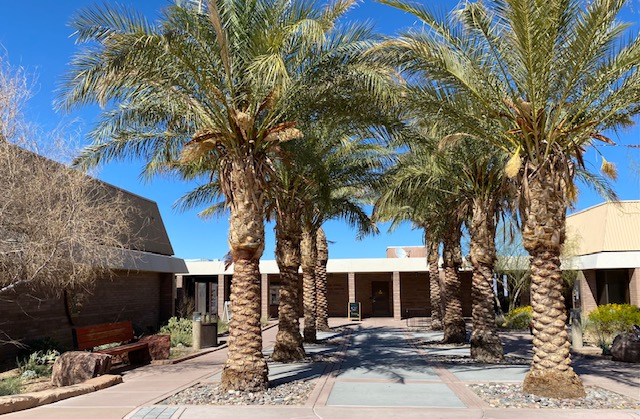 Lake Mead Visitor Center / Photo by Lizzie Gerecitano
Lake Mead Visitor Center / Photo by Lizzie Gerecitano
There are so many places to see and things to do on a trip to Lake Mead National Recreation Area. One way to experience this destination is with the Shaka Guide Hoover Dam/Lake Mead Tour. It’s chock full of stops, advice and detailed information you might not ever find out about on your own. Lake Mead is a vast, stunning recreation area chock full of scenic drives, overlooks, hiking trails, and Lake Mead itself, but it helps to have an idea of where to go.
1. The Visitor Center
The Visitor Center, located just off the same road as Hoover Dam is on (Boulder City Parkway) should be your first stop. Not only does it have a wonderful exhibit center and gift shop full of crafts from Native American artists, but there’s an Information Center with park rangers and volunteers on hand to not only deputize your kids and make them Junior Rangers, but a wealth of information and advice about hiking trails and detailed maps that you might actually get lost without.
2. Hike
The Historic Railroad Trail is a hiking must. It is a unique opportunity to walk along varying landscapes overlooking Lake Mead, plus you get to go through several tunnels that were used during the building of Hoover Dam to transport supplies. There is nothing like this anywhere else, and it is not only a beautiful hike (and pretty flat and easy) but each tunnel has its own character. Unlike some other tunnel hikes, this one is not full of graffiti. It’s almost exactly as it was left when Hoover Dam was finished! The trail itself goes all the way to Hoover Dam and is over seven miles long, but even just taking the trail a mile or so through the first couple of tunnels is a pretty great way to spend an hour or two. Stick to the trail, though, because although you’re walking a level path, that path is not at ground level and you’re actually pretty high up over the lake in spots.
3. Hit the Beach (yep, a beach in the desert)
Head down to the Boulder Beach shoreline. You may have seen Lake Mead from atop Hoover Dam, but to go right down to this bright blue body of water and see it up-close is lovely, too! Even if you’re not kayaking, canoeing or paddleboarding, it’s pretty nice meandering the rocky shoreline, dipping your toes (or taking a swim), and collecting pretty shells. There’s even a stand full of life vests if you want to borrow one, and rest rooms.
4. Go for a Scenic Drive
There are two wonderful roads for scenic driving, with plenty of overlooks to enjoy along the way. Those roads are Lakeshore Road and Northshore Road. Some of the wonderful overlooks along Lakeshore Road include the Sunset View Scenic Overlook and 33-Hole. There’s also a great hike at Owl Canyon leading down to a slot canyon where you might see owls, but it involves a scramble downhill at the beginning. You can access the trailhead by taking the road to 33-Hole road and making a left where the road splits.
Northshore Road is arguably one of the prettiest scenic drives in America. But make sure you have a full tank of gas if you’re planning to take the whole road. If you went all the way to the end, it would take you about an hour and lead you to Valley of Fire State Park (on your left). There, you’d need a couple of extra hours to explore all of the red rock formations. The Lost City is also up that way (on your right) which used to be underwater but now, due to drought conditions, you can go explore. But there is only one place to fill your tank once you leave Boulder City inside Lake Mead National Recreation Area, and that requires turning off of Northshore Road to Echo Bay as you approach Valley of Fire. Best advice: Stop in downtown Boulder City on your way to Lake Mead, fill up your gas tank, and grab a cooler for your car to fill with water, lunch and snacks if you’re heading out on a road trip!
The Northshore Summit Trail, about 15 miles up Northshore Road after turning onto it from Lakeshore Road, is a really nice stop (with a restroom) for the view or the hike. The payoff is your view from the top of that trail.
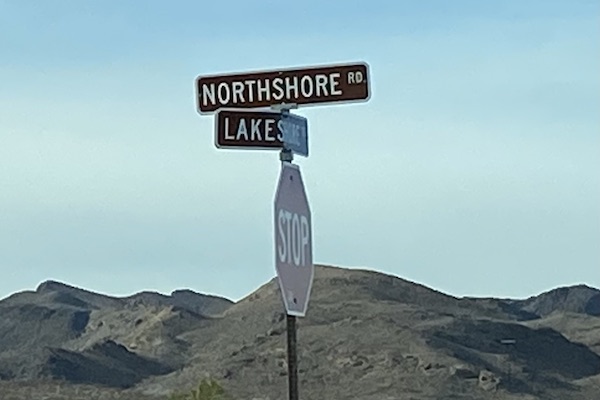 Northshore road sign / Photo by Lizzie Gerecitano
Northshore road sign / Photo by Lizzie Gerecitano
If you just wanted to head a little ways up Northshore Road to see some of those lava-capped mountains, you can turn back around once you’re ready to head to Vegas, head back down Northshore Road, and then turn right to head back to the city along East Lake Mead Boulevard. This is the most awesome, scenic (yet easy and quick) drive to downtown Las Vegas, and you’ll be rewarded with not only gorgeous mountains, but a skyline view of The Strip and the Stratosphere that will almost seem like a mirage once you realize just how close Lake Mead is to downtown Las Vegas!
5. Outdoor Activities
Now, if you’re visiting Lake Mead in the summer (or even the warmer weather months of Spring or Fall) there are a ton of water activities you can take part in. You can rent everything from a houseboat to a pontoon, kayak, canoe or paddle board, you can book a cruise along Lake Mead or go jet skiing or fishing. You can make a reservation to camp, or just spend a day here.
6. Boulder City
But if you have a couple of days to explore Lake Mead and Hoover Dam, spend a night or two at a hotel in downtown Boulder City in the historic district, and then enjoy your evening and morning strolling through this beautiful, pedestrian-friendly town full of shops and cafes. Make sure to check out the free Boulder City-Hoover Dam Museum inside the lobby of the Boulder Dam Hotel, and make a stop at Hemenway Park, especially in late-afternoon or early evening, when the bighorn sheep are likely to have come down from the mountain to graze the green grass. It is a one-of-a-kind sight!
7. Red Rock Canyon
And if you’re staying in Las Vegas and looking for more beauty outside of the city, you absolutely should head 15 miles west of Las Vegas and visit Red Rock National Conservation Area, (there’s a fabulous Shaka Guide Tour for that, too!)
8. Hoover Dam
Although this may seem obvious, the nearby Hoover Dam is a perfect companion to any Lake Mead itinerary. Check out Shaka Guide’s Hoover Dam & Lake Mead Tour to visit both.
RELATED: The Ultimate Hoover Dam Travel Guide
What To Pack
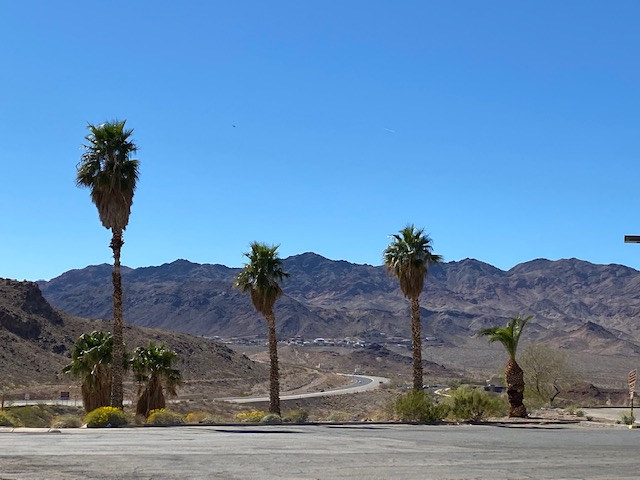 Lakeshore Road / Photo by Lizzie Gerecitano
Lakeshore Road / Photo by Lizzie Gerecitano
1. Snacks
In addition to stocking a cooler with picnic lunch items for Lake Mead (there is no place to buy food inside this national conservation area) make sure you have plenty of snacks and more water than you think you need, since the Mojave Desert can dangerously dehydrate you.
2. Shaka Guide (and car accessories)
Also, in case you decide to download a driving app to help you explore Lake Mead and the surrounding area (like Shaka Guide!), make sure you bring a car charging wire and adapter to connect to your car’s charging station, and a cell phone mount so that you can view your phone’s screen while driving.
3. Hiking Boots or Sneakers
High-top hiking shoes or high-top sneakers with good tread (for grip, and so you don’t get pricked by cacti).
4. Sun Protection
Sunglasses, sun hat, sunscreen.
5. Hiking Clothes
Think layers. Temps can drop in the evening and early morning. In the summer, temps can rise to above 110 degrees Fahrenheit during the day. And in winter, even if it feels warm during the day, temps can fall below freezing in the morning and evening.
Insulated canteen to keep your water cool.
6. Personal Locator Beacon
If you are traveling/hiking on your own, it is very wise to make sure that someone knows where you are heading and what time you plan to return. In addition, investing in a Personal Locator Beacon to keep in your backpack for an emergency could allow you to call for help, especially if you lose wifi or battery life in your cell, or if your car breaks down in the middle of the desert in an area where there are no other people. This is a vast desert.
RELATED: Know Before You Go, Hoover Dam & Lake Mead
Where To Stay
If you’re not staying in nearby Las Vegas, here are some alternatives closer to Lake Mead.
Best Western Hoover Dam. This is a great place in the heart of the Boulder City Historic District, with free parking and a pool. Reasonably priced. Leave your car there and stroll through this gorgeous little town’s shops and cafes. The hotel has a nice pub/restaurant on premises with outdoor seating, and ask about a voucher for breakfast across the street at the fabulous Southwest Diner!
Boulder Dam Hotel. This is a gorgeous, classic and quaint hotel featuring the incredible Boulder City-Hoover Dam Museum in the lobby. Their outdoor patio is in the heart of the historic district, so you can walk to shops and restaurants. This hotel sells out, so advanced reservations are necessary.
The Hoover Dam Lodge - This hotel is on the highway in Boulder City (instead of in the walkable, downtown historic district) and features a trail that leads down onto the Historic Railroad Hike in Lake Mead’s National Recreation Area.
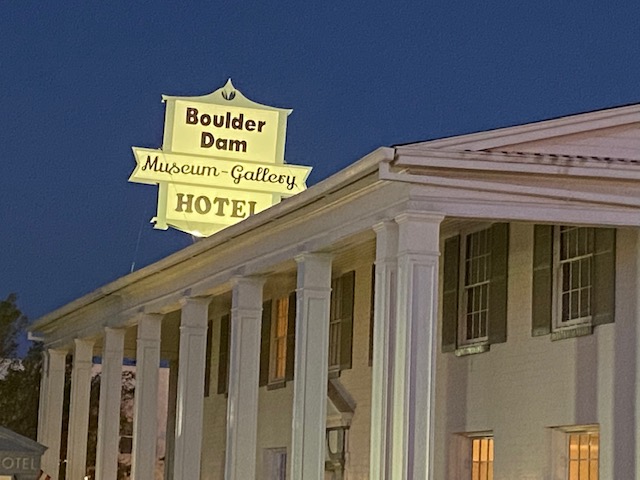 Boulder Dam Hotel / Photo by Lizzie Gerecitano
Boulder Dam Hotel / Photo by Lizzie Gerecitano
How Much Time to Allow for a Visit & Parking Info
Each place that we have recommended to visit inside Lake Mead has free parking areas, and most of the stops also have restrooms, with many having shaded picnic areas as well.
You could see quite a bit of Lake Mead in one day, but two or three days would be optimal if you want to head up to and explore Valley of Fire or to allow enough time for hiking, visiting Hoover Dam, and strolling around the historic district of Boulder City.
RELATED: 2-Day Itinerary: Hoover Dam & Lake Mead
Is Lake Mead Drying Up/Are Water Levels a Concern?
Due to a combination of climate change, years of drought conditions and expanding populations (and therefore a greater demand for water) in the area that Hoover Dam serves, Lake Mead has dropped below key thresholds in the past few years. As environmentalists continue to search for ways to refill the lake, our nation’s largest reservoir continues to drop in water level.
Lake Mead provides water to about 25-million people in Arizona, Nevada, California and parts of Mexico, and provides electricity to 1.3 million homes as well, in the form of hydroelectric power. But if Lake Mead water levels can’t be increased, the southwest will face unprecedented water cuts (starting with agriculture, then extending to municipalities) that will further reduce the amount of Colorado River water that can be used in cities.
The bottom line is that Hoover Dam, and the Glen Canyon Dam at Lake Powell (the dam above Hoover Dam) have been using more water than the Colorado river can provide. Effective changes must be made, or the Colorado River would eventually start to dry up and not be able to flow past Hoover Dam.
You can find out more of the details about this and many other geological and scientific facts about Lake Mead and Hoover Dam by downloading the Shaka Guide tour of Hoover Dam/Lake Mead. It does a really good job of explaining the challenges that enormous, man-made dams like this face.
RELATED: Why Was the Hoover Dam Built?
Ready to explore Lake Mead? Check out Shaka Guide’s Hoover Dam & Lake Mead Tour!



